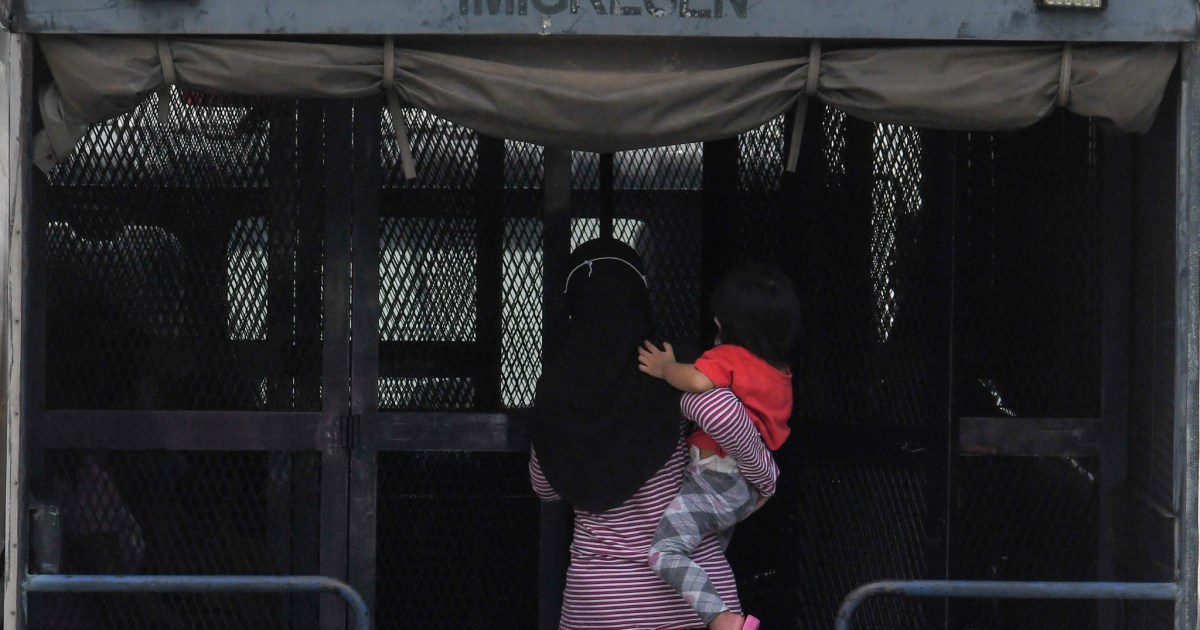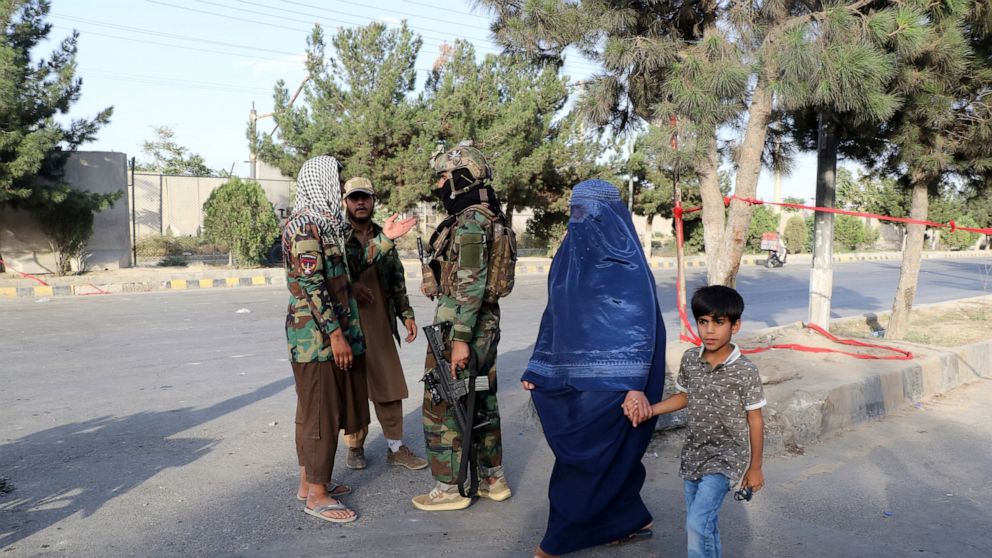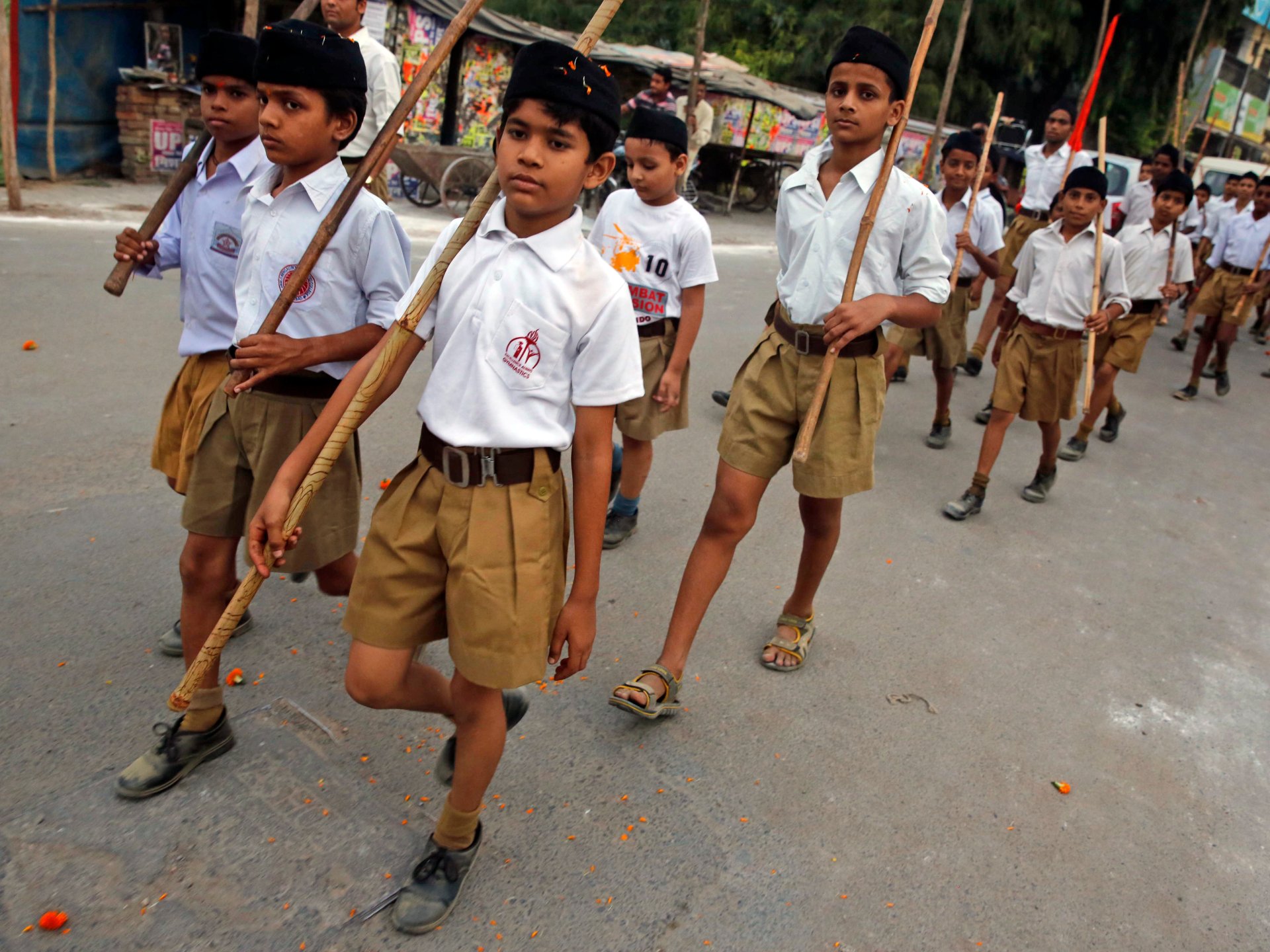Lone children among hundreds in Malaysia immigration detention | Malaysia
In December, Rafiullah’s fears were realised when his 14-year-old nephew was caught trying to enter Malaysia on foot and detained.
The boy is now among 756 children Malaysia’s home minister reported to be in immigration detention across the country as of October 26, and like 405 of them, Rafiullah’s nephew is on his own.
“This is the time when my nephew should be studying, but he has to serve his sentence,” Rafiullah, a Rohingya refugee from Myanmar, told Al Jazeera. “I worry his life will be destroyed.”
The Malaysian government has been working with civil society for years on alternatives to immigration detention for children – focusing on those who are alone or have been separated from their families – but progress has been slow. Meanwhile, hundreds of children languish in detention, which experts say can be detrimental to their physical and psychological wellbeing.
“If a child is accompanied or unaccompanied, whether refugee or undocumented migrant worker, they are still children,” professor Noor Aziah, the children’s commissioner of Malaysia’s Human Rights Commission, known by its Malay acronym SUHAKAM, told Al Jazeera. “The government must put children’s best interests as a first priority.”
Rafiullah, who had warned his relatives in Myanmar’s Rakhine State not to make the perilous journey to join him, was alarmed in September 2019 to learn that his two nephews, both primary school students, had gone missing from their village.
Three months later, he received a call from a human trafficker in Thailand, demanding 16,000 Malaysian ringgit ($3,900) for each child in order for them to complete the journey to Malaysia. The boys’ families paid the ransom, but only one of Rafiullah’s nephews made it to Kuala Lumpur. The other phoned Rafiullah’s relative to notify him he was being held at a detention centre in the state of Kelantan, in Malaysia’s northeast. The family has since been unable to reach him, nor have they received information about when he may be released.
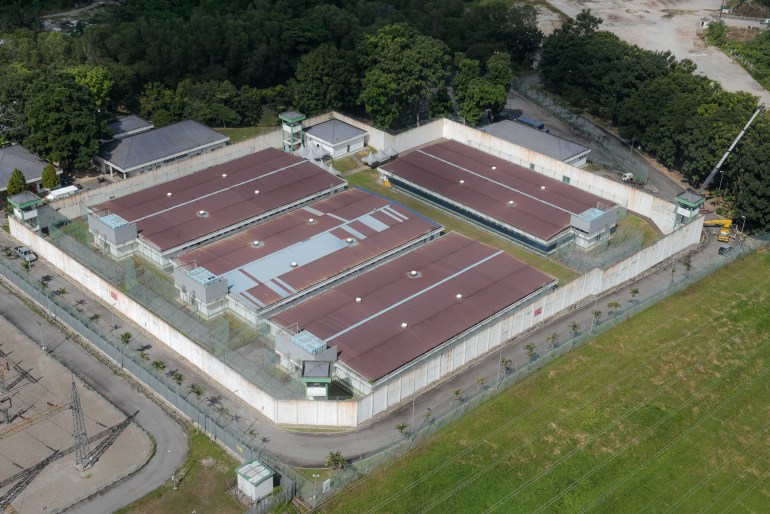 A view of Bukit Jalil immigration detention centre on the outskirts of the Malaysian capital, Kuala Lumpur. There are 11 detention centres around the peninsula. Picture taken on December 5 [Hasnoor Hussan/Al Jazeera]
A view of Bukit Jalil immigration detention centre on the outskirts of the Malaysian capital, Kuala Lumpur. There are 11 detention centres around the peninsula. Picture taken on December 5 [Hasnoor Hussan/Al Jazeera]Rafiullah told Al Jazeera he called the UN refugee agency, UNHCR, to request assistance in advocating for his nephew’s release, but received no reply.
Refused access
Al Jazeera contacted UNHCR and was told that the agency does not comment publicly on individual cases, but that when the detention of vulnerable individuals, such as children, is brought to their attention, and the individuals are found to be in need of international protection, UNHCR will advocate with relevant government agencies for immediate access and their urgent release.
UNHCR faces a critical obstacle, however: Malaysia has refused the agency access to the country’s immigration detention centres since August 2019, leaving it unable to meet asylum seekers and refugees who may have been detained and assess their protection needs. “We are aware and concerned that there remain in detention a number of persons of concern, including vulnerable individuals, requiring our attention,” Thomas Albrecht, who heads UNHCR’s Kuala Lumpur office told Al Jazeera.
Nearly 180,000 refugees are registered with the agency in Malaysia, the vast majority from Myanmar, while thousands more await registration. But Malaysia, which is not a signatory to the UN Refugee Convention, does not have a legal framework for refugees, leaving them vulnerable to detention as undocumented migrants. Nearly 1,000 unaccompanied and separated refugee and asylum-seeking children were registered with UNHCR as of 2018.
Malaysia’s immigration laws also do not distinguish children from adults, leaving children subject to adult arrest and detention conditions and without access to education or play. Children under 12 are held with adult women, while boys over 13 are held with adult men, according to SUKA Society, a Malaysian child rights organisation.
SUHAKAM documented 118 deaths in immigration detention from 2015 to 2016, while in 2017, Reuters reported that former detainees, government agencies and rights groups had spoken of overcrowding, poor sanitation, limited access to nutritious food or healthcare, and beatings by camp guards. Noor Aziah, the children’s commissioner, told Al Jazeera that overcrowding, the lack of separate facilities for children and families, and the absence of provisions for education or play remain critical concerns.
A 2019 UN global study on children deprived of liberty found that detaining children can lead to significant physical and mental health issues. The UN Convention on the Rights of the Child, to which Malaysia is a party, prohibits detaining children for immigration reasons, and Malaysia’s Child Act of 2001 stipulates that a child’s best interests should be a priority.
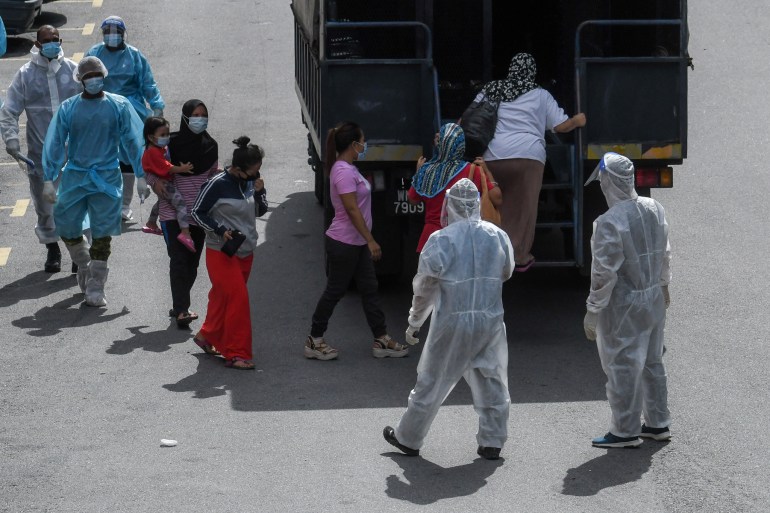 Women and children are escorted into an Immigration Department truck during a raid last month in Kajang near Kuala Lumpur. Local media reported a total of 141 people, including six children, were detained [Hasnoor Hussain/Al Jazeera]
Women and children are escorted into an Immigration Department truck during a raid last month in Kajang near Kuala Lumpur. Local media reported a total of 141 people, including six children, were detained [Hasnoor Hussain/Al Jazeera]According to findings published by UNICEF in 2018, holding children in immigration detention is never in their best interest and should be avoided at all costs. In addition to violating the children’s rights, it is expensive, difficult to administer, and rarely effective in deterring or managing migration.
Alternatives under discussion
In November, Human Rights Watch called for Malaysia to immediately release all detained children and grant the UNHCR access to detained refugees and asylum seekers. “These vulnerable children, including many who likely fled atrocities in Myanmar, should be cared for, not treated as criminals,” said Phil Robertson, deputy Asia director, in a statement.
Initiatives promoting alternatives to detention have been going on for years. In 2014, Malaysia’s immigration department, together with SUHAKAM and various governmental and non-governmental organisations, formed a working group to operationalise alternatives to detention for unaccompanied and separated children. The group developed standard operating procedures for a pilot programme offering temporary shelter and case management services through local nongovernmental organisations.
A proposal to implement the pilot with five children was submitted to Malaysia’s cabinet in 2018, but approval has not yet been granted, according to Tini Zainuddin, co-founder of Yayasan Chow Kit, the organisation designated to take responsibility for sheltering the children during the pilot.
Noor Aziah of SUHAKAM told Al Jazeera that early this year, the Ministry of Women had shown support for the pilot, but that the change of government in February and the pandemic left the process in limbo.
“Unaccompanied children should be given alternatives to detention,” she said. “They are just victims. They cannot be guilty of any offence because their parents made the decision to send them to Malaysia.”
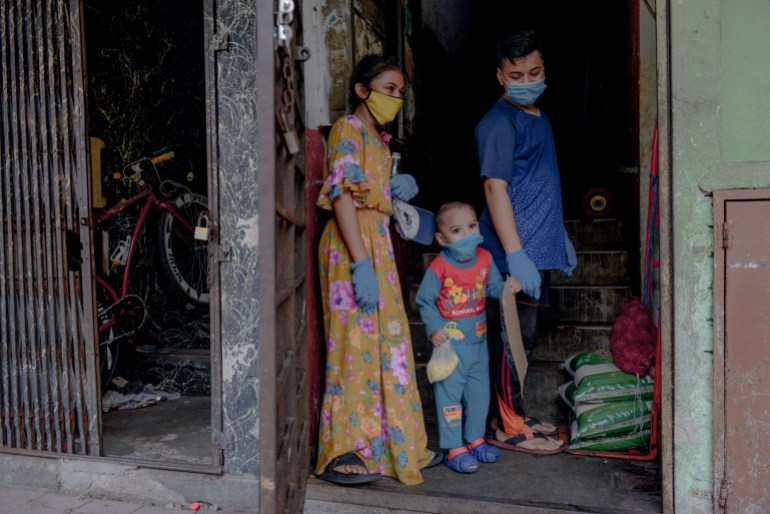 A family in the Selayang neighbourhood of Kuala Lumpur on April 15. There was a raid in the area a month later and more than 1,000 arrested over their immigration status, according to Malaysian media [Hasnoor Hussain/Al Jazeera]
A family in the Selayang neighbourhood of Kuala Lumpur on April 15. There was a raid in the area a month later and more than 1,000 arrested over their immigration status, according to Malaysian media [Hasnoor Hussain/Al Jazeera]Al Jazeera contacted Malaysia’s Ministry of Home Affairs and Immigration Department for comment, but did not receive a reply.
Malaysia has stepped up immigration-related arrests since May, when raids left more than 2,000 detained. In total, more than 8,000 people were detained for immigration violations between May 1 and November 9. At least five immigration detention centres have also seen outbreaks of the coronavirus, with 776 cases reported in May and June. There are 11 detention centres dotted around the Malaysian peninsular.
In April and May, citing coronavirus prevention measures, Malaysian authorities repeatedly turned back boats which had embarked from refugee camps in Bangladesh, carrying hundreds of Rohingya refugees seeking asylum; dozens are reported to have died at sea. On June 8, authorities intercepted a damaged boat of Rohingya asylum seekers off the coast of the island of Langkawi, and detained all 269 surviving passengers.
Ibrahim, a Rohingya refugee in Kelantan, believes his wife, brother and two children, aged 12 and eight, were on board.
Ibrahim, whose son was just a toddler and daughter not yet born when he left for Malaysia from a refugee camp in Bangladesh in 2012, had paid human smugglers in February to bring his family to join him. He has been unable to make contact with them since, but said he received a phone call from an NGO shortly after the boat was intercepted, notifying him of his family’s detention, and that he recognised a photo of his son on the news. He has sent two letters to UNHCR, but said he has received no reply.
“My children wanted to study, but now, they don’t have the chance,” Ibrahim told Al Jazeera. “I want my wife and children to be released … so that at least we can have a life together.”
*Pseudonyms have been used for Rafiullah and Ibrahim to protect their security.
Jaw Tu Hkawng contributed to this report.

